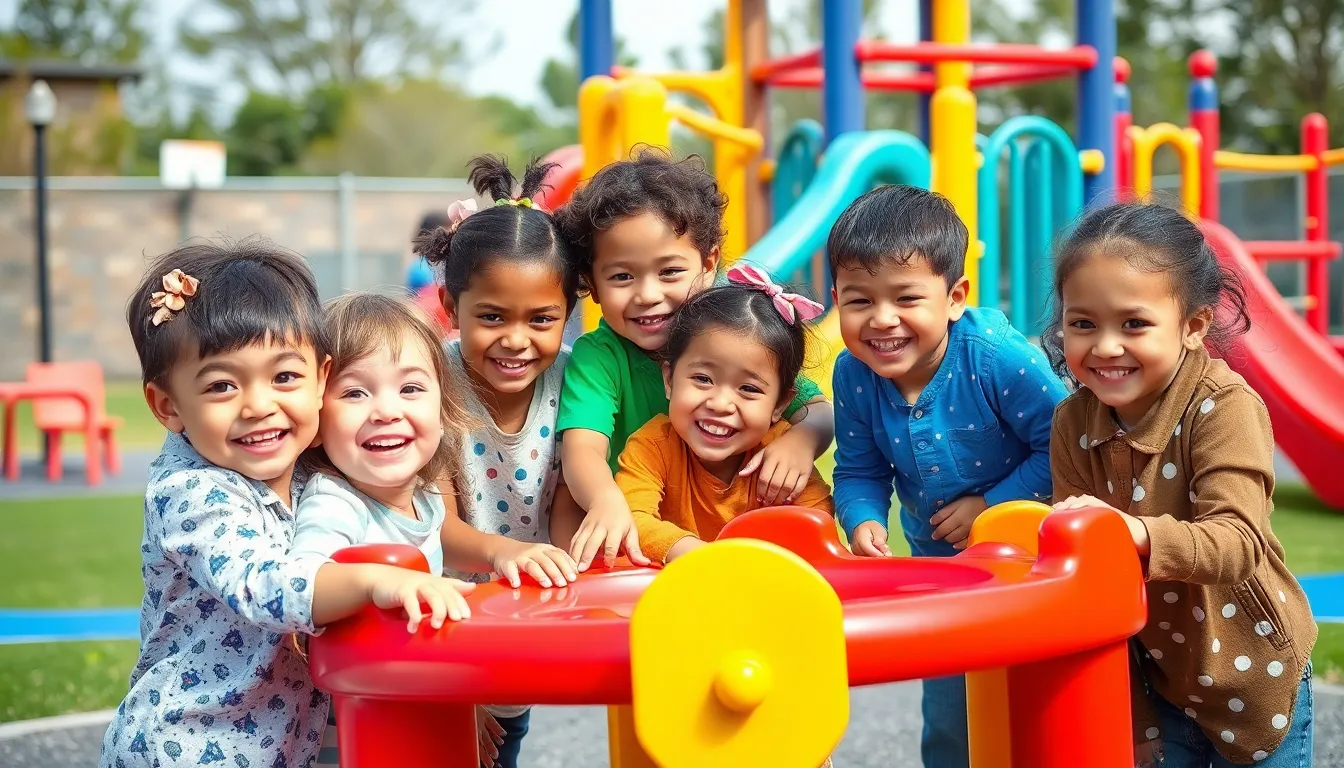Table of Contents
TogglePreschool development isn’t just about finger painting and snack time, though those are pretty sweet perks. It’s a crucial stage where tiny minds blossom and imagination takes flight. Parents often wonder what magical ingredients make up a successful preschool experience. Spoiler alert: it’s not just the glitter and glue!
Overview of Preschool Development
Preschool development encompasses various essential growth areas that shape a child’s future. Cognitive development, social interaction, and emotional understanding are crucial components during this stage. Children actively engage in play-based learning, which fosters critical thinking and problem-solving skills.
Physical development also plays a significant role. Activities like climbing, running, and fine motor skills enhancement contribute to a child’s overall health and coordination. Early exposure to these activities establishes a strong foundation for lifelong fitness habits.
Creativity flourishes in preschool environments. Children express themselves through art, music, and imaginative play, encouraging innovation and self-exploration. This creative freedom nurtures a child’s ability to think outside the box.
Social skills develop through collaborative play and structured group activities. Interaction with peers teaches sharing, negotiation, and empathy. Building these connections leads to positive relationships and a sense of community.
Language development is another critical aspect. Vocabulary expands through storytelling, songs, and conversations. Engaging with diverse language resources equips children with the skills to communicate effectively.
Emotional development also receives significant attention. Teachers create nurturing environments where children can express feelings and understand others’ emotions. This emotional intelligence lays the groundwork for resilience and adaptability.
Ultimately, preschool development combines these interconnected areas to support comprehensive growth. Children benefit from a balanced program that recognizes the importance of each element in their overall development. Engaging preschool experiences enrich children’s lives while preparing them for future educational journeys.
Key Areas of Development

Preschool development focuses on various essential growth areas that significantly shape a child’s future.
Cognitive Development
Cognitive development involves enhancing thinking, understanding, and problem-solving skills. Children engage in play-based learning that promotes critical thinking and decision-making. Activities like puzzles and storytelling encourage curiosity and imagination, essential for intellectual growth. As children explore their environment, they learn to ask questions and find answers. Such interactions boost memory and concentration, laying a strong foundation for academic success.
Social Development
Social development emphasizes the importance of interaction and communication with peers. Through collaborative play, children learn to share, take turns, and negotiate. Engaging in group activities fosters a sense of belonging and teaches empathy. Preschool settings often provide opportunities for role-playing and teamwork, enhancing social skills. These interactions not only build friendships but also prepare children for future relationships in school and beyond.
Emotional Development
Emotional development focuses on understanding and expressing feelings effectively. In nurturing environments, children feel safe to voice their emotions and recognize those of others. Activities that promote storytelling or dramatic play encourage empathy and emotional awareness. Teachers often support children in identifying emotions, helping them cope with challenges. This foundation fosters resilience and emotional intelligence, vital for lifelong success.
Physical Development
Physical development involves improving coordination, strength, and overall health through active play. Activities like climbing, running, and dancing enhance motor skills and fitness. Outdoor play areas provide space for children to explore and develop agility. Fine motor skills also benefit from tasks such as crafting and drawing. Establishing healthy habits at this age promotes lifelong wellness and physical activity enjoyment.
Importance of Preschool Education
Preschool education plays a crucial role in shaping a child’s developmental trajectory. This foundation sets the stage for numerous long-term advantages.
Long-Term Benefits
Strong early learning experiences lead to enhanced academic performance in later years. Research shows that children who attend preschool tend to score higher on standardized tests. Additionally, they exhibit better social skills and emotional regulation, which are vital for successful relationships. Early exposure to structured learning fosters a greater likelihood of pursuing higher education. Statistics demonstrate that preschool attendees are 40% more likely to graduate from high school compared to their peers. Overall, the long-term benefits of preschool education significantly impact an individual’s success in school and beyond.
Impact on Learning
Preschool education significantly influences how children approach learning. Engaging in play-based learning encourages curiosity and exploration, essential for nurturing a love for knowledge. Children encounter problem-solving activities that boost critical thinking abilities. Skills gained during preschool, such as focusing attention and following directions, translate into academic readiness. Furthermore, taking part in group activities enhances communication skills, preparing them for classroom interactions. With enriching experiences in preschool, children adapt better to structured learning environments, fostering lifelong academic enthusiasm.
Best Practices in Preschool Development
Creating effective preschool development involves implementing best practices that enhance learning experiences. Engaging environments play a key role in fostering children’s growth.
Engaging Learning Environments
Engaging learning environments include vibrant, dedicated spaces that stimulate children’s senses. Natural light and colorful decorations capture interest and invite exploration. Incorporating various areas for block play, reading, and art encourage self-directed learning. Creating cozy corners promotes quiet time, allowing children to relax and reflect. Ensuring accessibility to materials enables children to make choices, fostering independence and creativity. Interactive displays featuring children’s work celebrate accomplishments and encourage pride in individual efforts. Additionally, outdoor spaces provide opportunities for physical activity and hands-on exploration, further enriching the learning experience.
Curriculum Approaches
Curriculum approaches in preschool focus on fostering holistic development through play-based learning. Integrating hands-on activities encourages creativity and curiosity while meeting developmental milestones. Active participation in group projects promotes collaboration and social skills. Employing themes relevant to children’s interests enhances engagement and retention of information. Incorporating diverse cultural materials enriches children’s understanding of the world, fostering inclusivity. Emphasizing language-rich interactions supports vocabulary growth and communication skills. Continuous assessment guides educators in tailoring experiences that align with each child’s needs and interests, ensuring a dynamic, supportive learning atmosphere.
Challenges in Preschool Development
Preschool development faces several challenges that can impact young children’s growth. Access to quality education remains a primary concern.
Access to Quality Education
Access to quality education varies across different communities. Many low-income families encounter barriers such as limited funding and a shortage of resources, which affect enrollment in preschools. Research indicates that children from less affluent backgrounds are less likely to attend high-quality preschool programs. Factors like transportation difficulties and lack of awareness about educational benefits further complicate matters. These obstacles can lead to disparities in educational outcomes, with children who attend quality preschools experiencing better long-term academic performance and social skills.
Addressing Diverse Needs
Addressing diverse needs in preschool environments is critical for effective learning. Children come from various cultural, linguistic, and developmental backgrounds, necessitating differentiated instruction. For instance, some children may require additional support in language development, while others may need accommodations for physical or learning disabilities. Educators must create inclusive settings that celebrate diversity and promote engagement. Professional development for teachers plays an essential role in equipping them with strategies to meet individual children’s needs. Collaborative efforts among families, teachers, and specialists also enhance the support network for each child, fostering a sense of belonging and encouraging full participation in learning activities.
Preschool development is a critical phase that lays the groundwork for a child’s future success. By engaging in play-based learning and fostering essential skills across cognitive, social, emotional, and physical domains, children gain the tools they need to thrive. Quality preschool experiences not only enhance academic readiness but also promote emotional intelligence and resilience.
Access to quality education remains a challenge, particularly for underprivileged communities. It’s vital to create inclusive environments that cater to diverse needs, ensuring every child has the opportunity to flourish. Ultimately, investing in preschool development is an investment in a child’s lifelong journey of learning and growth.




